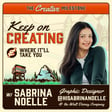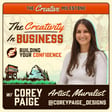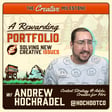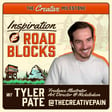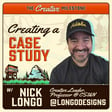
Manifest with Your Passion Projects w/ Cezar Arvelo
Your portfolio isn’t just a collection of work—it’s a reflection of who you are as a designer and where you’re headed. But what happens when you realize it’s not telling the right story?
In our first episode of The Creative Milestone, we sit down with senior graphic designer Cezar Arvelo, who made the decision to start over from scratch in his early years. It wasn’t because his work was bad—it just wasn’t him anymore. Through passion projects, self-reflection, and a relentless commitment to growth, he rebuilt a portfolio and personal brand that truly represented his skills and vision.
Join us as Cezar shares invaluable advice for designers at any stage, from portfolio strategy to creating work that excites you. If you're looking to craft a portfolio that resonates, this is the episode for you.
Make sure you follow @creativemilestone and @cezararevlo and subscribe to this podcast. More episodes coming soon!
